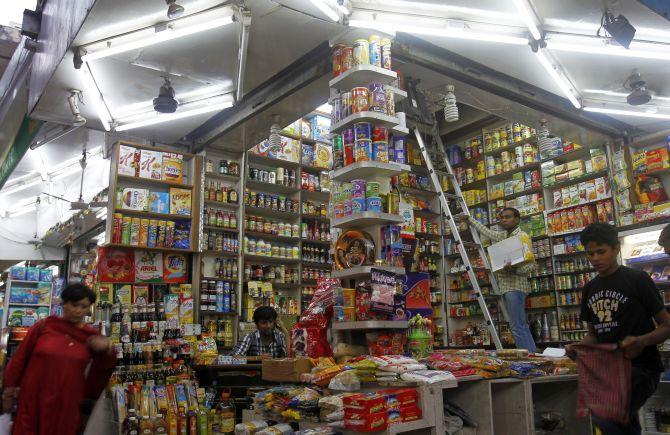National brands prefer the acquisition route since the southern market is culturally different, reports T E Narasimhan from Chennai.
Entrepreneurs have realised that things have become more competitive and to go national, they need to piggy-back with somebody. Photograph: PTI Photo.
Fast moving consumer goods (FMCG) companies in the south are opening the door for investors.
Mergers and acquisitions (M&A) data in the segment during 2015-16 shows that FMCG entities from the north and west are acquiring more southern brands. Examples in 2015 were Hindustan Unilever, Godrej Agrovet and Future Consumer Enterprises.
The last-named acquired MNS Food in May 2015 (deal size not disclosed); Godrej Agrovet acquired Creamline Dairy for $23 million in December 2015. The same month, Hindustan Unilever announced the acquisition of Indulekha for $50 million.
And, this month, Future Retail announced the acquisition of Heritage Foods. This, it said, would complement its existing network of 379 small-format EasyDay stores in north India.
"The consolidation of Heritage small-format stores brings us closer to the homes of customers in the three key metros in southern India," said Kishore Biyani, chairman and managing director. "Scale plays an important role in retail and this forms part of our strategy, of aggressively expanding our small stores network to around 3,000 nationally by 2021."
Heritage retail is one of the strong brands in the south. Dharmender K Matai, its operations head at the retail & bakery division, said the dairy segment was growing and being health-related, many FMCG companies were trying to be part of it.
The organic and traditional foods segment was growing at 25 per cent yearly. And, ayurveda formula-based companies and products are seeing new demand; large multinationals without a presence are acquiring brands to expand their portfolio or to launch a new line.
C K Ranganathan, chairman, CavinKare, said a number of private equity (PE) entities are chasing South Indian companies since the latter's quality is high, as is credibility.
Entrepreneurs have also realised that things have become more competitive and to go national, they need to piggy-back with somebody. So, they are open for acquisitions or getting acquired or for PE infusion.
"Either you should have the guts to go national with the help of PE or encash what you have created, which more people are opting for," he said.
National brands prefer the acquisition route since the southern market is culturally different and they'd like to occupy the existing brand than building their own in the new markets. The entry of national brands will put pressure on the southern ones because the former invest heavily.
Selling out is an option. And, retailing needs huge involvement, besides being capital-intensive. Hence, formerly conservative FMCG companies have started opening the door for investors.
As examples, Manna Foods rasied $5 million in May 2015 from Fulcrum Venture India. In May 2016, Maiyas Food raised $30 million from Peepul Capital and Ascent Capital. The same month, Srikrishna Milks raised $2 million from Capvent, and in October, Dairy Classic Creams raised $17 mn from Motilal Oswal.
"However, the reality is that southern India is high in terms of per capita consumption and nowhere has penetration reached saturation point. Always having been used as a product testing ground by FMCG players, given its demography of a more evolved consumer, it has become a tough market for these very companies," said an expert.